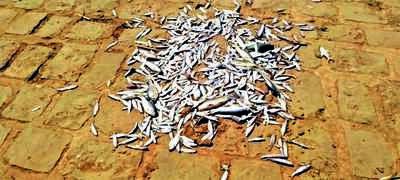- News
- City News
- mangaluru News
- Phalguni River fish death: NGT asks joint committee to look into incident
Phalguni River fish death: NGT asks joint committee to look into incident

Mangaluru: Taking cognisance of the death of fish in Phalguni River in Dakshina Kannada, principal bench of the National green Tribunal (NGT), New Delhi has constituted a five-member joint committee to investigate the incident.
The committee comprises regional officers of the Union ministry of environment, forests and climate change, the Karnataka State Pollution Control Board (KSPCB), department of fisheries, along with authorities of the Dakshina Kannada district administration.
KSPCB will serve as the nodal agency, ensuring coordination between officials of the disparate departments and compliance to the norms. Members of the committee are expected to meet within the next fortnight, and visit Phalguni River soon after.
The members are expected to interact with the stakeholders, and subsequently ascertain the exact reason that led to the death of fish in the river. Armed with this information, the panel is then expected to suggest suitable remedial measures to avert such an incident in the future. If sources of pollution are identified, such establishments or places will be served a notice, demanding a response. In its order, the NGT stated that, based on the observations made by the committee, the statutory regulators may take remedial action, while following due process of the law. A report on the action taken to check pollution around the river is to be filed within two months, the order read.
The principal bench of the NGT pointed out that prima facie evidence seemed to point to industries in the area discharging untreated effluents into the river. In the absence of any regulatory checks by the authorities concerned, this constituted a violation of the Water (Prevention and Control of Pollution) Act, 1974, the bench noted. Highlighting the need to enforce the Rule of Law, and the need to protect the environment and local biodiversity, the bench recommended remedial action.
The bench said that the specific stretch of the River Phalguni may be treated as being polluted for the purpose of formulation and execution of a restoration plan. The target for restoration of water quality is Class B of the Primary Water Quality Criteria.
The committee comprises regional officers of the Union ministry of environment, forests and climate change, the Karnataka State Pollution Control Board (KSPCB), department of fisheries, along with authorities of the Dakshina Kannada district administration.
KSPCB will serve as the nodal agency, ensuring coordination between officials of the disparate departments and compliance to the norms. Members of the committee are expected to meet within the next fortnight, and visit Phalguni River soon after.
The members are expected to interact with the stakeholders, and subsequently ascertain the exact reason that led to the death of fish in the river. Armed with this information, the panel is then expected to suggest suitable remedial measures to avert such an incident in the future. If sources of pollution are identified, such establishments or places will be served a notice, demanding a response. In its order, the NGT stated that, based on the observations made by the committee, the statutory regulators may take remedial action, while following due process of the law. A report on the action taken to check pollution around the river is to be filed within two months, the order read.
The principal bench of the NGT pointed out that prima facie evidence seemed to point to industries in the area discharging untreated effluents into the river. In the absence of any regulatory checks by the authorities concerned, this constituted a violation of the Water (Prevention and Control of Pollution) Act, 1974, the bench noted. Highlighting the need to enforce the Rule of Law, and the need to protect the environment and local biodiversity, the bench recommended remedial action.
The bench said that the specific stretch of the River Phalguni may be treated as being polluted for the purpose of formulation and execution of a restoration plan. The target for restoration of water quality is Class B of the Primary Water Quality Criteria.
FOLLOW US ON SOCIAL MEDIA
FacebookTwitterInstagram
Looking for Something?

Start a Conversation
end of article
Visual Stories
Quick Links
Delhi Air PollutionDelhi TemperatureChennai WeatherBangalore TemperatureCovid vaccination centres in DelhiCoronavirus in DelhiRTPCR test in GurgaonHyderabad RainPollution level in BangaloreDelhi SmogDelhi TemperatureNoida AQIGurgaon AQI todayFire in MumbaiMumbai RainsCovid 19 RT PCR Test in NoidaDelhi AQI todaySrinagar encounter

